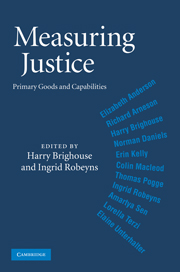Book contents
- Frontmatter
- Contents
- List of contributors
- Acknowledgments
- 1 Introduction: Social primary goods and capabilities as metrics of justice
- PART I THEORY
- 2 A critique of the capability approach
- 3 Equal opportunity, unequal capability
- 4 Justifying the capabilities approach to justice
- 5 Two cheers for capabilities
- PART II APPLICATIONS
- PART III CONCLUDING ESSAY
- Index
- References
2 - A critique of the capability approach
Published online by Cambridge University Press: 05 June 2012
- Frontmatter
- Contents
- List of contributors
- Acknowledgments
- 1 Introduction: Social primary goods and capabilities as metrics of justice
- PART I THEORY
- 2 A critique of the capability approach
- 3 Equal opportunity, unequal capability
- 4 Justifying the capabilities approach to justice
- 5 Two cheers for capabilities
- PART II APPLICATIONS
- PART III CONCLUDING ESSAY
- Index
- References
Summary
During the past twenty-five years, the capability approach, developed by Amartya Sen and Martha Nussbaum, has come to play a major role in political philosophy and normative economics. This approach has gained much support, among academics as well as among international agencies and nongovernmental organizations, at the expense of competing resourcist and welfarist approaches exemplified, respectively, by John Rawls's theory and utilitarianism.
Here I examine how the capability approach has been, and might be, justified as superior to, in particular, its resourcist competition. I reach two main conclusions. First, this question should not be answered in isolation, but can be plausibly resolved only in conjunction with other key elements of a conception of social justice. Instead of asking which approach is superior, we should ask which approach can deliver the most plausible public criterion of social justice. Second, neither Sen nor Nussbaum has so far shown that the capability approach can produce a public criterion of social justice that would be a viable competitor to the more prominent resourcist views.
While I concentrate my critical attention on the capability approach and reject much of the case made in its favor, my intent is wholly constructive. I am working on the same problem as the pioneers of the capability approach and I do not have all the answers any more than they do. If they can learn from my critique even a fraction of what I have learned from their work, I will be well satisfied.
Keywords
- Type
- Chapter
- Information
- Measuring JusticePrimary Goods and Capabilities, pp. 17 - 60Publisher: Cambridge University PressPrint publication year: 2010
References
- 37
- Cited by

